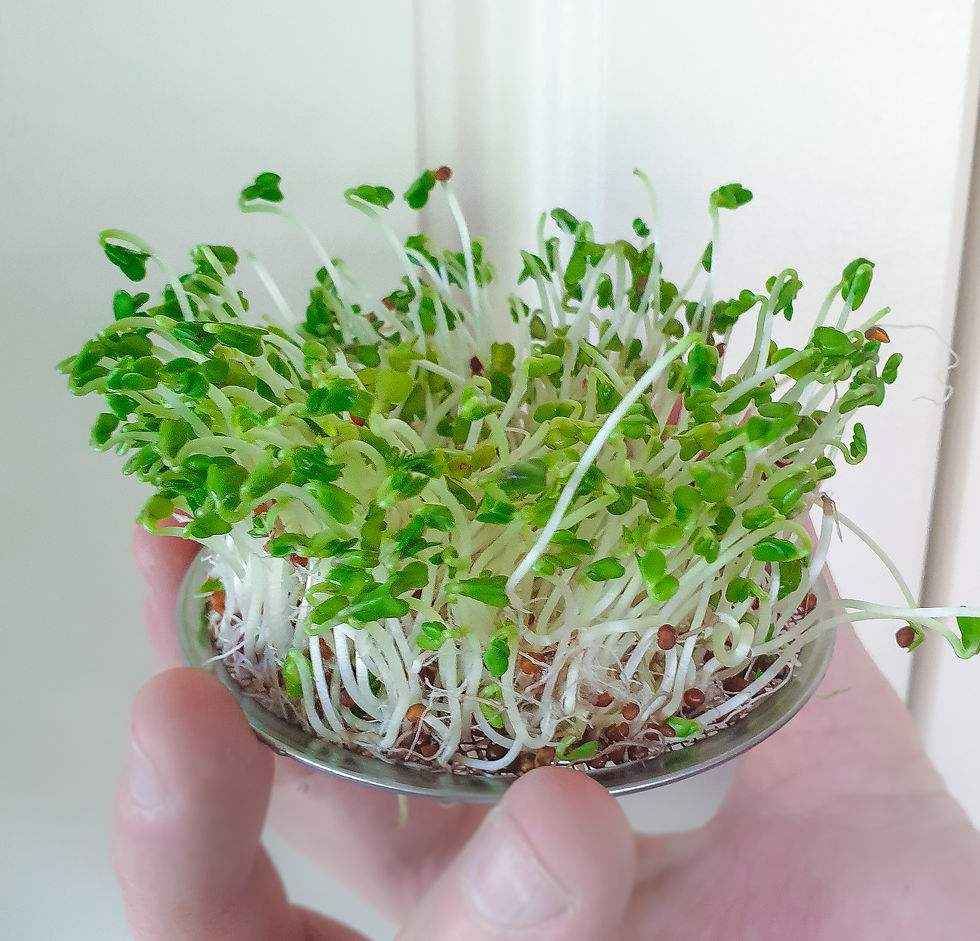Benefits of Sulforaphane
- Lindsay Blyth

- Aug 7, 2019
- 4 min read
Updated: Nov 17, 2020

There is a substance called Sulforaphane found in cruciferous vegetables; especially broccoli sprouts. There are many studies that have been conducted, proving it to be anticancer, antimicrobial, anti-inflammatory, neuroprotective, and may also protect against aging and diabetes. What's the Best Part!!?? We don’t need costly supplements to get this super phytochemical!! You can grow broccoli sprouts in your own home with our DIY Kits! (Keep reading to find the link below)

Broccoli Sprouts contain the highest identified concentration of sulforaphane. 100 x more than fully mature broccoli! It's always great to eat all your green veggies, and they contain many vitamins and minerals that help with a range of health benefits. But Broccoli Sprouts have the most Sulforaphane! (Other cruciferous vegetables including broccoli are, cauliflower, Brussels sprouts, cabbage, collards, kale, watercress, radish, and mustard greens.)
How does Sulforaphane work on our body? Well, saying these vegetables contain sulforaphane is actually simplifying things. Here is the biology behind it: Brassica vegetables contain myrosinase, which helps break down glucosinolates into usable forms of isothiocyanates* including sulforaphane. This happens in the body when we literally break down the plant by chewing, blending or chopping and consume.
Isothiocyanates are naturally occurring small molecules that are formed from glucosinolate precursors of cruciferous vegetables. Many isothiocyanates display anticarcinogenic activity because they reduce activation of carcinogens and increase their detoxification. Numerous studies support the fact that phytochemicals found in certain food substances protect against cancer. Cruciferous vegetables have been widely accepted as potential diet components that may reduce the risk of cancer. Isothiocyanates are abundant in cruciferous vegetables such as broccoli, watercress, Brussels sprouts, cabbage, Japanese radish and cauliflower, and they significantly contribute to the cancer chemopreventive activity of these vegetables. Some isothiocyanates derived from cruciferous vegetables, such as sulforaphane (SFN), phenethyl isothiocyanate (PEITC), and benzyl isothiocyanate (BITC), are highly effective in preventing or reducing the risk of cancer induced by carcinogens in animal models. They also inhibit the growth of various types of cancer cells. This exert is taken from Acta Pharmacol Sin. 2009 May; 30(5): 501–512. Published online 2009 May 5. doi: 10.1038/aps.2009.50

SULFORAPHANE. So. Many. Benefits.
DETOXIFYING - Boosts the antioxidant capacity of cells rather than just providing antioxidants. Sulforaphane also activates Nrf2 and ARE pathways which increases cellular glutathione - a MASTER ANTIOXIDANT!
ANTI-INFLAMMATORY - Sulforaphane is a potent Nrf2 activator. Nrf2 is a protein in every cell in the body. When it is activated, by stress, it binds to ARE ( Antioxidant Response Element ) which is the switch that controls antioxidant production in the body. So when Nrf2/ARE activates, your body starts making glutathione and other antioxidants. This reduces inflammation and helps the body protect against disease.
BRAIN BOOST - Sulforaphane has the ability to cross the blood-brain barrier. That means it's super abilities can affect the brain! Studies in mice showed that the compound reduced depressive symptoms and anxiety. It's also found to increase neurite growth and help damaged neurons repair after injury and from aging.
PROTECTION AGAINST CANCER - The amount of information coming up relating Sulforaphane and anti-cancer is HUGE! I think I will do a separate blog on this topic. Once that is complete I will add a link in Here. But a quick summary shows it prohibits the growth of cancer cells while encouraging the growth of healthy cells.
HEART HEALTH- Studies also found that it helped reduce blood pressure levels in those with hypertension and lowered triglycerides. It also reduced levels of total cholesterol, LDL-C, CRP, and LDH (in animal trials).
WEIGHT LOSS - Sulforaphane (SFN) can help with obesity by improving gut flora. This happens by enhancing energy consumption within the metabolic system.
LIVER PRODUCTIVITY - SFN supports the liver by reducing oxidative stress. It also may improve alcohol tolerance and reduce the negative effects of alcohol by inducing aldehyde dehydroenases.

Eat Broccoli Sprouts!
The reason to eat Broccoli Sprouts to get the most sulforaphane, instead of broccoli or other cruciferous veggies, is because Broccoli Sprouts contain up to 100 times higher concentrations of glucoraphanin and sulforaphane than the mature plants.
These levels spike on day three of sprouting, making three-day-old broccoli sprouts one of the best sources on the planet. Bonus? Broccoli sprouts are likely also the least expensive source of sulforaphane on the planet!
You can start growing them in your own home and consuming them fresh is best! With our DIY Kits, you have everything you need to start sprouting and benefiting from sulforaphane.
Here is the link : https://www.sproutedaustralia.com.au/product-page/500-gram-sprouting-kit
We recommend 1/2 cup to 1 cup of sprouts per day. 1 Jar holds 2 cups of mature broccoli seeds. Just 2 tablespoons will fill the whole jar with mature sprouts. 100 grams contains approximately 9 tablespoons of seeds.
HOW TO SPROUT:
1. Put 2 tbsp of Broccoli seeds into the jar and allow to soak for 8 hours or overnight, in a cool, dark place.
2. Rinse in fresh water and drain all the water out.
3. Leave your jar upside down, tilted on a angle to allow excess water to drain and for air flow.
4. Rinse the seeds twice times daily.
5. It will take about 4 days in total for the shoots to turn a dark green and they’re ready to eat.
6. Store your seeds in the fridge or freezer.
7. 2 tbsp seeds makes two cups of fresh sprouts.
8. Consume 1/2 cup of sprouts daily.
Thanks for taking the time to learn about Sulforaphane and Broccoli Sprouts! If you have any questions please drop us a line! #sulforaphane #broccolisprouts #sprouting #cancerfighting #freshisbest #homegrownsprouts












Comments